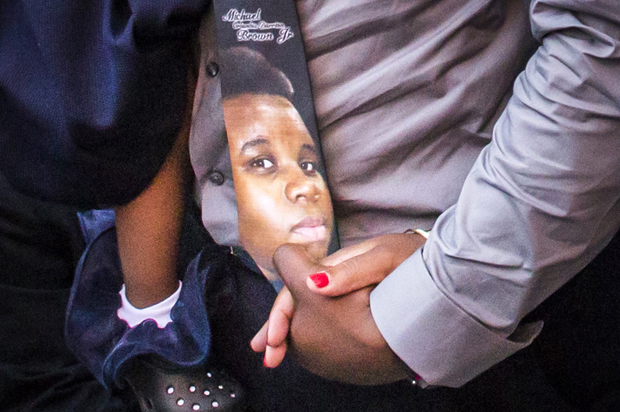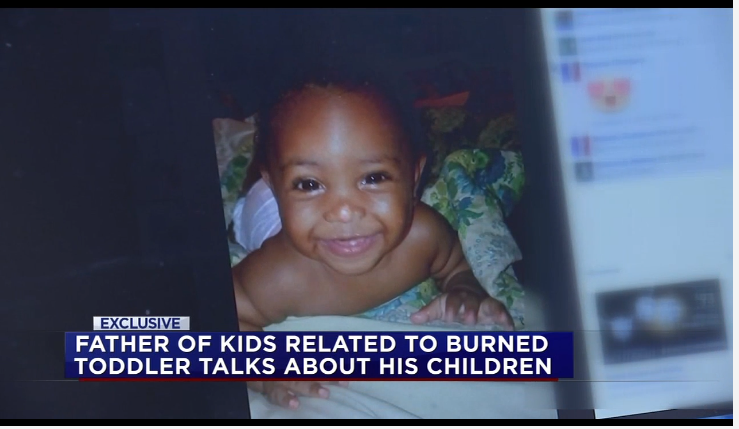A fog of war has descended on the events that led to the Mike Brown’s untimely death in Ferguson, Missouri, on Aug. 9, 2014, a fog that local, state and federal authorities have made little effort to dispel. The goalposts for what appeared initially to be a clear-cut case of either manslaughter or second degree murder are increasingly obscured while the prospect of justice for Mike Brown seems correspondingly remote.
Supporters of the police and Officer Wilson quickly sought to equate Mike Brown’s very existence with the same racially tainted doctrine of deterministic criminality that was used to undercut the prosecution of George Zimmerman. The release of a convenience store surveillance video by the Ferguson Police Department was central to a strategy of “retroactively trying to justify Brown’s death” while, at the same time, tainting potential jurors with a narrative that is likely to be inadmissible in court. Ferguson police chief Thomas Jackson initially said that the “initial contact with Mike Brown was not related to the robbery,” and then backtracked later the same day.
While Mike Brown has been smeared as a thug with marijuana in his bloodstream and a passel of allegedly stolen Swisher Sweets clutched in his giant fist, Darren Wilson, on the other hand — despite shooting an unarmed man six times — was described by his police chief as a “gentle, quiet man.” Friends have anonymously contributed like encomiums, describing Officer Wilson as “very respectful” and “a man without a temper.” Another alleged friend, known only as “Josie,” called “The Dana Show” on NewsTalk 97.1 KTFK to further cloud the air with what was supposedly Darren Wilson’s version of events, an accounting that is contradicted by numerous eyewitness accounts of Brown’s death.
As the grand jury decision approaches (it’s expected to come any day now), the odds against justice for Mike Brown on this unstable, canted playing field are lengthened by a legal doctrine that affords an unequal measure of the presumption of innocence to the police when civilians are shot. The standard of reasonable doubt is replaced by a standard of “reasonable fear.”
“If an officer believes he or someone else is in imminent danger of grievous injury or death,” the New York Times recently reported, “he is allowed to shoot first, and ask questions later.”
Of course, fear is by nature neither reasonable nor rational. This is the key difference between reasonable doubt and reasonable fear that the second phrase attempts to camouflage. Instead of reasonable doubt, which would normally evaporate in the presence of compelling eyewitness testimony, a juror needs to only be convinced that they would feel fear in similar circumstances, either for themselves or for others, to vote against the conviction.
If, under the best of circumstances, a second degree murder or manslaughter conviction in an officer-involved shooting is unlikely, the prospect of a media circus and a corrosive national “debate” is a certainty. Nonetheless, as legal momentum and public outrage builds, we seem compelled to join in this dubious exercise, no matter what the outcome or cost.
If a fog may have descended on the events leading up to Mike Brown’s shooting, our view of the events immediately following is, so far, unimpeded. No one disputes the following: After the shooting, Mike Brown lay face down on the sidewalk. Officer Wilson did not check to see if Mike Brown was breathing or if he had a pulse; nor did he render aid in any way, shape or form. In fact, as the quote that prefaces this article makes clear, Officer Wilson not only did not render aid himself; he actively prevented alleged medical professionals from rendering aid as well.
While the New York Times charitably opines that “Mr. Brown probably could not have been revived,” this is retroactive rationalization and speculation. Even if the time of Brown’s death could be established to the minute with certainty, which it cannot, the fact that he might have or probably would have died anyway does not excuse Officer Wilson’s omission of his duty to rescue. Adding insult to lethal injury, the police left Mike Brown’s body on the street for four hours. The medical examiner did not arrive for more than two hours. An ambulance was apparently never called.
While Officer Wilson’s motivations and state of mind in this instance are of great interest, they are of little moment. Here, it doesn’t matter if Wilson felt fear. Nor does it matter if six dozen Swisher Sweets lay scattered beside Mike Brown’s lifeless body, or even if a pistol was hidden under Mike Brown’s shirt. Mike Brown was dying as a result of actions — right or wrong — taken by Officer Wilson; Wilson failed in his duty as a peace officer and as a human being.
In the United States, as opposed to in Europe, moral obligation is generally seen as a function rooted in conscience, not law. Whether immunized from lawsuits by Good Samaritan laws or not, Americans are exempt from a duty to stop and render aid in most states, except Vermont and Minnesota, except under certain, narrowly defined circumstances. “This is true even “when that aid can be rendered without danger or inconvenience to” the potential rescuer.”
The common law does, however, recognize a legal duty to render aid under the following circumstances (partial list):
- Duty Based on a Contract
- Duty Based on Creation of Peril
Examples of a duty based on a contract include the duty of a physician to a patient, and the duty of a lifeguard to a swimmer. Is it not reasonable to expect that the outcome of universally training police in first aid and CPR is that they use these skills to come to the aid of the public that they are sworn to protect and to serve? In this sense, whether or not the duty to rescue the public is explicitly enshrined in Missouri statutes, an “implied affirmative statutory duty” may exist nonetheless.
The duty to rescue based on creating the risk is more explicit, existing whether “the bystander’s endangering acts were intentional, negligent, or, as some courts have held, completely innocent.” Officer Wilson’s endangering act is factually established and beyond dispute. Officer Wilson had both a moral and a legal duty to come to the aid of Mike Brown, an unarmed man whom he shot multiple times. In one notable precedent, an individual who beat someone unconscious and abandoned them by the side of a road was charged with murder when the victim was subsequently hit by a truck. Wilson’s dereliction of his duty, as a human being and an officer of the law, likewise sealed Mike Brown’s fate.
While there may be scant precedent for charging a police officer with failure to rescue, there is ample precedent that establishes the difficulty of overcoming both reasonable doubt and reasonable fear in police shooting cases. In the case of Officer Wilson, there is every reason to expect not only a divisive and unsatisfying outcome in the event of a manslaughter or murder charge, but also local and national civil unrest.
Pragmatically calculating the likelihood of success for the prosecution of Officer Wilson for the manslaughter or murder versus his omission of his duty to rescue Mike Brown suggests that the odds are long in both cases. The first strategy will inevitably be seen as a referendum on race relations, no matter what the outcome. The second strategy has more to do with humanity, morality and accountability. The power of summary execution embodied in the omission by police of their duty to rescue has been employed often enough that it has become a cinematic cliché.
This must end. If, in Missouri, there is no statutory duty requiring state and local police to rescue and render aid, the prosecution of Officer Wilson could inspire enshrining this moral duty into law in Missouri and elsewhere. Civilized countries do not leave men to bleed to death on the pavement, no matter what their crime, or how their survival might inconvenience the living. As the aftermath of the shooting of Mike Brown in Ferguson has demonstrated, police in America currently have all of the killing tools they need.
Source: Salon














































































































































































































































![[Video] Chicago Police Officers Caught On Video Telling Two Black Men "We Kill Mother F**kers"](https://earhustle411.com/wp-content/uploads/2018/07/evil-cop-3-300x180.jpg)
![[Video] Chicago Police Officers Caught On Video Telling Two Black Men "We Kill Mother F**kers"](https://earhustle411.com/wp-content/uploads/2018/07/evil-cop-3-80x80.jpg)












![[Video] White Woman Calls The Cops On Black Real Estate Investor, Cops Threaten To Arrest Her For Harassing Him](https://earhustle411.com/wp-content/uploads/2018/05/nosy-neighbor-300x180.png)
![[Video] White Woman Calls The Cops On Black Real Estate Investor, Cops Threaten To Arrest Her For Harassing Him](https://earhustle411.com/wp-content/uploads/2018/05/nosy-neighbor-80x80.png)


![White Scientist Says The Black Community Is Being Targeted By The Medical System, They Are Deliberatly Being Poisoned [Video]](https://earhustle411.com/wp-content/uploads/2016/05/mike-adams-300x180.jpg)
![White Scientist Says The Black Community Is Being Targeted By The Medical System, They Are Deliberatly Being Poisoned [Video]](https://earhustle411.com/wp-content/uploads/2016/05/mike-adams-80x80.jpg)








![Teenage Girl Shot In Her Stomach Three Times But Took Time To Post To Facebook [ Video]](https://earhustle411.com/wp-content/uploads/2016/02/Gangster-chick-300x180.jpg)
![Teenage Girl Shot In Her Stomach Three Times But Took Time To Post To Facebook [ Video]](https://earhustle411.com/wp-content/uploads/2016/02/Gangster-chick-80x80.jpg)







